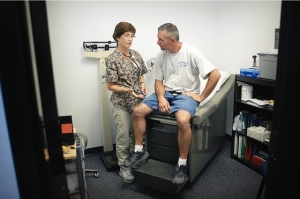WATCH nurse sees positives in Cuba
By Phyllis Moore
Published in News on September 5, 2012 1:46 PM

News-Argus/MICHAEL BETTS
Nurse Practitioner Kathy Johnson has a medical consultation with Wayne Goss at the WATCH Clinic inside of the Goldsboro Family YMCA. Ms. Johnson recently returned from a trip to Cuba where she saw firsthand how universal health care can work.
When Wayne Action Teams for Community Health, or WATCH, was introduced more than a decade ago to provide health care for the uninsured and underinsured in Wayne County, Kathy Johnson was hired as nurse practitioner.
Except for a brief departure a few years ago to care for her own mother, she was able to return to the position when WATCH opened a satellite clinic at the YMCA.
It's rewarding to lend a hand to those who need it, she says, but not without its challenges, especially compared to other countries.
Ms. Johnson recently traveled to Cuba with a "Witness for Peace" delegation, a U.S. organization that travels to other countries to share cultures and ideas. The only representative from Wayne County, she and the group of two dozen visited roof gardens, organic co-ops, patio gardens, a nursing home and a community clinic, as well as urban and rural gardens.
The 10-day trip was an opportunity to look at sustainable agriculture and poverty.
"Because of the embargo the U.S. has placed on imports, they are unable to get fertilizers and pesticides and have been forced to learn organic agriculture, and now raise vegetables in abundance," she said. "They have many farming cooperatives which raise enough food to also feed school children, nursing homes and hospitals."
The people there also espouse a very "can-do attitude," she said.
"Our bus broke down as we came from a two-hour trip to the country to an organic farm," she said. "Three women fixed it with string. One of our group had a problem with allergies, so he went to a little store looking for medicine. The owner of the store flagged down a doctor in the street and got him to write a prescription for the person.
"The people really value their free health care and education. They know they are missing out on some of the technology that we have but they wouldn't trade their access to health care and education for it."
Among her observations, she said, were the glaring lack of fast food chains and obesity.
"We saw almost no one that was overweight," she said. "People eat mostly beans and rice, mangos and pineapple, but nobody starves.
"We just didn't see obesity. Because they have the outdoor market and a lot of people grow (produce) in patio gardens, roof gardens, the diet is very basic. They do have some chicken but much less of the red meat and pastries and things that we love so much."
People in that country may have been forced to go to organic growing, but the by-product is better health, Ms. Johnson said.
As a health care provider herself, she paid particular attention to the administration of such services in Cuba.
"Because it's a national health care system, everybody can get health care," she explained. "There's nobody that falls between the gap like we see in WATCH.
"There are community clinics in all the neighborhoods that provide physical care, mental health care. They use a lot of alternative medicines also."
By contrast to the U.S., the technology is lacking and most people do not have health insurance.
"They're aware that not everybody here can get health care and they say, 'We know that we don't have some of the things that you have,'" she said. "They say that the younger kids would like the iPads and some of those things, but are so grateful and wouldn't trade it for what we have."
Witnessing firsthand how health care is managed was refreshing, Ms. Johnson said, but also disturbing.
"Seeing other cultures, they were just so warm and friendly and gracious," she said. "It was really nice to see that they're happy.
"I get so frustrated with the gaps we have in health care because the money isn't involved, they can refer to the specialists they need. They have more than enough doctors. They're exporting them to the Dominican Republic and other countries."
